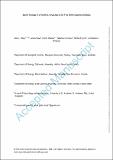Sperm storage in a family-living lizard, the Tree Skink (Egernia striolata)
Abstract
The ability to produce viable offspring without recently mating, either through sperm storage or parthenogenesis, can provide fitness advantages under a suite of challenging ecological scenarios. Using genetic analysis, we demonstrate that three wild-caught female Tree Skinks (Egernia striolata) reproduced in captivity with no access to males for over a year, and that this is best explained by sperm storage. To the best of our knowledge, this is the first time female sperm storage has been documented in any monogamous family-living reptile, including social Australian egerniine skinks (from the subfamily Egerniinae). Furthermore, by using paternal reconstruction of genotypes we show that captive-born offspring produced by the same females in the preceding year, presumably without sperm storage, were sired by different males. We qualitatively compared aspects of these females' mates and offspring between years. The parents of each litter were unrelated, but paternal and offspring genotypes from litters resulting from stored sperm were more heterozygous than those inferred to be from recent matings. Family-living egerniine skinks generally have low rates of multiple paternity, yet our study suggests that female sperm storage, potentially from outside social partners, offers the real possibility of benefits. Possible benefits include increasing genetic compatibility of mates and avoiding inbreeding depression via cryptic female choice. Sperm storage in Tree Skinks, a family-living lizard with a monogamous mating system, suggests that females may bet-hedge through extra-pair copulation with more heterozygous males, reinforcing the idea that females could have more control on reproductive outcomes than previously thought.
Citation
Riley , J L , Stow , A , Bolton , P E , Dennison , S , Byrne , R & Whiting , M J 2021 , ' Sperm storage in a family-living lizard, the Tree Skink ( Egernia striolata ) ' , Journal of Heredity , vol. In press , esab048 . https://doi.org/10.1093/jhered/esab048
Publication
Journal of Heredity
Status
Peer reviewed
ISSN
0022-1503Type
Journal article
Description
This work was supported by the Australian Research Council (ARC DP130102998 grant to MJW and RWB), Natural Sciences and Engineering Research Council of Canada (scholarship to JLR), the Australasian Society for the Study of Animal Behavior, the Australian Museum, and Macquarie University (scholarship to JLR).Collections
Items in the St Andrews Research Repository are protected by copyright, with all rights reserved, unless otherwise indicated.

